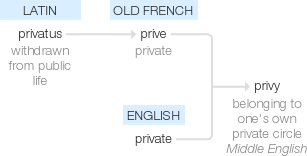Privy
Middle English (originally in the sense ‘belonging to one's own private circle’): from Old French prive ‘private’ (also used as a noun meaning ‘private place’ and ‘familiar friend’), from Latin privatus ‘withdrawn from public life’ (see private).
wiktionary
From Middle English pryvy, prive, from Old French privé(“private”), from Latin prīvātus(“deprived”), perfect passive participle of prīvō(“I bereave, deprive; I free, release”). Doublet of private.
etymonline
privy (adj.)
early 13c., "secret, concealed, not made known in public;" c. 1300, of places, "secluded," from Old French privé "friendly, intimate; a private place," from Latin privatus "private, personal" (see private (adj.)). Meaning "participating in (a secret)" (usually with to) is attested from late 14c. Related: Privily. Privy Council is from c. 1300 in a general sense; specifically of the British government, first attested late 14c. (with French word order) as consaile priue. Privy member "organ of sex" is from late 13c.
privy (n.)
"latrine, outdoor toilet in a small shed, outhouse," c. 1200, from Old French privé, privee "latrine," literally "private place," from noun use of adjective privé (see privy (adj.)).
